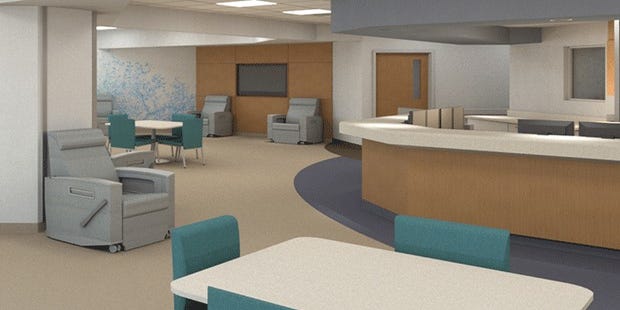Durham Police Board supports Ontario Shores’ bid to build an alternative mental health emergency room in Canadian first
Published December 22, 2021 at 11:38 am

Durham Police Services Board is supporting Ontario Shores Centre for Mental Health in its bid to build Canada’s first EmPATH Unit, an alternative to traditional emergency departments focused on helping patients suffering mental health crises.
Dr. Phil Klassen, Vice-President of Medical Affairs at Ontario Shores, presented his findings regarding improved outcomes to the Board in their December 21 meeting.
“Pre-pandemic people were… using the emergency department for mental health and addiction problems at a rate far greater than the population growth,” he said. His data shows a 27 per cent increase in emergency department use for mental health services across Ontario between 2013 to 2018. There was only a four per cent increase in visits for other reasons.
Per Klassen’s presentation, this shows, “Ontario emergency rooms are facing a mental health crisis,” as Ontarians remain unable to get the help they need despite a large jump in demand for those services.
Durham Police are left to deal with this increased demand with apprehensions under the mental health act increasing 77 per cent over the same period in Durham Region.
After transporting someone apprehended on a mental health act call, first responders in Durham Region spend and average of 80 minutes with the patient in the emergency room, costing the Region roughly $400,000 a year.
In Klassen’s experience, the pressure to allow first responders to leave the ER quickly has “bedevilled the healthcare system for sometime,” and creates significant tension in a hospital environment.
“Those who have been in an ED know it’s a challenging place to be at the best of times,” Klassen said, “Unless you have those kinds of conditions perfectly suited to an ED,” listing heart attacks, strokes or physical trauma as examples.
“That’s what the ED is really about, but it’s not well-suited to deal with mental health,” he continues. “Patient experiences are poor, wait times are long and people don’t get treatment.”
Often this results in a process known as “psychiatric boarding,” or the offloading of a mental health patient into an unsuitable treatment facility because there are no beds to provide the needed services.
As an alternative to this system, Klassen recommended the Region move to the Emergency Psychiatric Assessment, Treatment and Healing (EmPATH) model of care for mental health patients.
Dr. Scott Zeller described them a, “soothing, home-like and supportive atmosphere of the community crisis clinic with the ability to accept even the most acute psychiatric patients,” in a 2017 Psychiatric Advisory article.
An EmPATH unit provides immediate psychological assessment followed by immediate psychiatric and pharmacological treatment. Health care workers have a set 24 hours to intervene before health care workers decide whether the patient is admitted or discharged.
In the meantime, patients stay together in an open common area, resting in recliners instead of traditionally defined hospital rooms. Per Klassen’s report this, “reduces agitation and promotes service user choice, autonomy, dignity and shared decision making.”
Private rooms surround the common area for counseling sessions and patients have access to an open air courtyard. They have a minimal nursing station as nursing staff are meant to be constantly circulating the unit, always treating patients.
The concept was born in Oakland, California, growing to around 22 units in the United States, according to Klassen. As part of their research, Klassen and his team toured three or four such units pre-COVID to prepare. Canada, meanwhile, has no EmPATH Unit of its own
Klassen found numerous benefits to this model, as it decreases repeat mental health crises in patients, thereby reducing calls to police. It also reduces how many patients end up admitted to hospital, and how long they remain there.
Klassen notes that one in three patients suffering a mental health crisis are admitted under the current system. Fewer admissions under the EmPAth model offset the increased cost to run overall.
In a traditional ED 33 per cent of mental health patients are admitted, while only 20 per cent are in an EmPATH unit. Klassen says the operating budget would be around $10 million annually, “really a drop in the bucket,” in the grand scheme of healthcare funding.
Patient satisfaction increases dramatically under the EmPATH model. “Restraint use is high. Oftentimes many folks in the ED now are really strapped to a gurney for significant periods,” Klassen said in reviewing a previous study of a unit in Iowa, but drops in the EmPATH model, for example. Other studies in Portland and San Francisco have seen similar positives
Ontario Shores is looking to institute an EmPATH unit as part of its, “larger plan to build more space,” per Klassen. Noting the strong relationship between Ontario Shores and DRPS, he asked for support in government interaction and budget submissions.
We’re hoping DRPS can help advocate for this,” he said. “We think that, ultimately, all EDs should look like this, but what we need is a proof-of-concept in Canada, and there has been no proof-of-concept in Canada.”
Ontario Shores has letters of support for the project from Lakeridge Health in Oshawa Scarborough and Peterborough, which Klassen says has EDs, “swamped” with mental health patients.
The Board unanimously voted to support the project and will lobby the Region’s MPP’s and Minister of Health Christine Elliott for theirs.
insauga's Editorial Standards and Policies advertising






